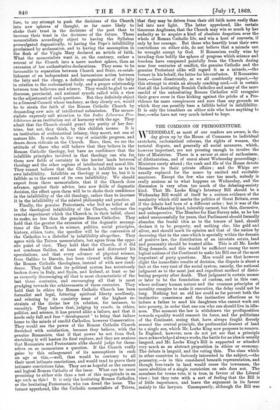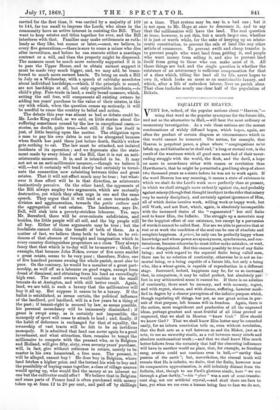THE COMMONS ON PRIMOGENITURE.
1TEDNESDAY, as most of our readers are aware, is the VY day given up by the House of Commons to individual crotchets, ecclesiastical reforms, the rights of women, the teetotal dispute, and generally all social measures, which, however important, are not pressing enough to involve the fate of Ministries. There is a savour at once of enthusiasm, of dilettanteism, and of ennui about Wednesday proceedings ; Ministers rarely attend ; the rank and file of the House devote themselves to their private affairs ; and the Whips are usually replaced for the nonce by excited and excitable amateurs. Except the few who care too much, nobody is really anxious as to what happens on Wednesday, and the discussion is very often too much of the debating-society kind. That Mr. Locke King's Intestacy Bill should be a Wednesday Bill would of itself be a curious evidence of the insularity which still marks the politics of Great Britain, even if the debate had been of a different order ; but it was of the regular Wednesday kind, tolerably earnest, but thin, discursive, and unimpressive. The Member for East Surrey asks, as he has asked unsuccessfully for years, that Parliament should formally abandon the feudal idea as to the tenure of land, should declare it to be property, and nothing else, like gold and silver, and should mark its opinion and that of the nation by decreeing that in the case which is specially within the domain of positive law, the distribution of an intestate estate, land and personalty should be treated alike. This is all Mr. Locke King demands, and this would be sufficient among the more logical nations of the Continent to make his Bill one of the most important of party questions. Men would see that however slight the immediate results of decision, the dispute is about a fact at the very root of the social system, namely, the national judgment as to the most just and expedient method of distri- buting property after death. That judgment is certain sooner or later to be the foundation of custom, and in this case, where ordinary human nature and the common principles of morality conspire to make it executive, the delay could not be long. Nothing but an old law could so far pervert both the instinctive conscience and the instinctive affections as to induce a father to send his daughters who cannot work out into poverty, in order that one son who can should live in idle- ness. The moment the law is withdrawn the predisposition towards equality would reassert its force, and the politicians of the Continent, seeing that, have always fought fiercely around the central principle, the preferential descent of land to a single son, which Mr. Locke King now proposes to remove. In England, however, men do not yet see that a principle once acknowledged always works, the battle for an idea is usually languid, and Mr. Locke King's Bill is supported or attacked very much as an abstract proposition in ethics or economy. The debate is languid, and the voting thin. The class which in other countries is furiously interested in the subject,—the peasantry, —is in this considered beneath representation, and though free-trade in land would rouse the townsmen, the mere abolition of a single restriction on sale does not. The members for towns vote, it is true, in favour of the Liberal view ; but they vote with a sort of feeling that the Bill is of little importance, and leave the argument in its favour mainly to the lawyers. Consequently, although the Bill was
carried for the first time, it was carried by a majority of 169 to 144, far too small to impress the Lords, who alone in the community have an active interest in resisting the Bill. They want to keep estates and titles together for ever, and the Bill interferes with that. Families may make settlements as ruth- lessly as they like, but sooner or later,—once, we believe, in every five generations,—there is sure to come a minor who dies after investiture, and before he can execute either a marriage contract or a will, and then the property might be dispersed. The measure must be much more earnestly supported if it is to pass the Upper House, and to obtain earnest support it must be made very much bigger, and, we may add, be trans- ferred to much more earnest hands. To bring on such a Bill in July on a Wednesday, with a speech of rubbishy anecdotes about individual hardships,—which, if the principle is sound, are not hardships at all, but only regrettable incidents,--is child's play. Free-trade in land, a really broad measure, which, setting the soil free, will compensate all existing owners by adding ten years' purchase to the value of their estates, is the cry with which, when the question comes up seriously, it will be needful to rouse the country to belief and action.
The debate this year was almost as bad as debate could be. Mr. Locke King relied, as we said, on little stories about the suffering sometimes caused by the law in exceptional cases,— stories, no doubt, quite true,—but still, if the law itself is just, of little bearing upon the matter. The obligation upon a man to pay his own debts is not to be abrogated because when Smith has paid them just before death. Smith's widow gets nothing to eat. The law must be attacked, not isolated incidents of its operation ; and we deprecate also the state- ment made by every friend of the Bill, that it is not an anti- aristocratic measure. It is, and is intended to be. It may not act as an anti-millionaire measure,—though we believe it will,—but it certainly will tend slowly but certainly to termi- nate the connection now subsisting between titles and great estates. That it will not effect much may be true ; but what- ever it does effect will be in that direction, as aristocrats instinctively perceive. On the other hand, the opponents of the Bill always employ two arguments, which are mutually destructive, yet which they often urge in one and the same speech. They argue that it will tend at once towards sub- division and agglomeration, towards the petite culture and the aggregation of vast estates. The landowner, says Dr. Ball, will sink into a poverty-stricken labourer. Yes, says Mr. Beresford, there will be over-minute subdivision, and besides, the little people will all sell, and the big people will all buy. Either of these arguments may be true ; but the fendalists cannot claim the benefit of both of them. As a matter of fact, we believe them both to be false, to be evi- dences of that absence of foresight and imagination which in every country distinguishes proprietors as a class. They always fancy that that which is to-day will be to-morrow ; think, for example, that because John Nokes, owner of five acres amidst a great estate, seems to be very poor ; therefore, Nokes, one of five hundred persons owning the whole parish, must also be poor. On the contrary, he would be a member of a great part- nership, as well off as a labourer on good wages, exempt from dread of dismissal, and obtaining from his land an exceedingly high rent. The small owners would combine as the small tenants do at Assington, and with still better result. Again, land, we are told, is such a luxury that the millionaires will buy it all up. But suppose it ceases to be a luxury. If the ballot is established, as seems certain, the political influence of the landlord, quti landlord, will in a few years be a thing of the past; if tenant-right is secured by law, as seems possible, his personal ascendancy will be immensely diminished ; if game is swept away, as is certainly not impossible, the monopoly of sport will cease to attach to land ; and, finally, if the habit of deference is exchanged for that of equality, the ownership of vast tracts will be felt to be an invidious monopoly. It is admitted that land can never again be a good investment, and what attraction; then, remains to tempt the millionaire to compete with the peasant who, as in Belgium and Holland, will give fifty, sixty, even seventy years' purchase, will, in fact, give without reference to return, merely to be master in his own homestead, a free man. The peasant, it will be alleged, cannot buy? He does buy in Belgium, where land fetches a higher price, and the instant his wish to buy and the possibility of buying came together, a class of village usurers would spring up, who would find the money at an interest no one but the cultivator could offer? We believe that in Belgium and some parts of France land is often purchased with money taken up at from 12 to 20 per cent., and paid off by shillings at a time. That system may be, nay is, a bad one ; but it is not open to Mr. Hope at once to denounce it, and to say that the millionaires will have the land. The real question at issue, however, is not this, but a much larger one, whether it is just or worth while, for the sake of keeping up an aristo- cratic constitution, to prevent the sale of land like any other article of commerce. To prevent swift and cheap transfer is to prevent people who want land from getting it, and people who want money from selling it, and also to prevent land itself from going to those who can make most of it. All those things are bad, and the single question is whether the existence of an aristocracy is sufficient compensation for that of a class which, tilling the land all its life, never hopes to own it, which looks on meat as an unattainable luxury, and which, after a life of unbroken labour, lives on parish alms. That class includes nearly one clear half of the population of Britain.































 Previous page
Previous page